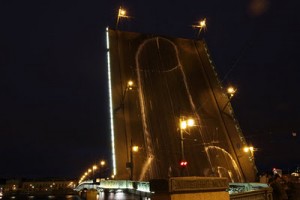International Documentary Film Festival Amsterdam (IDFA) 2012: Russian Dissent Expressed through Art Picks up Pace
Voina, a Russian artivist collective specalising in provocative street art against state control, has released a documentary which recently screened at the International Documentary Festival in Amsterdam (IDFA).
The film, Tomorrow, chronicles the history of the group from their early beginnings as shoplifting squatters to their biggest and most controversial piece, painting of a gigantic penis on a drawbridge in front of the headquarters of the Federal Security Service in St Petersburg.
While the group has more than sixty members since its creation in 2006 the movie focuses on the core of them, known only by their self-chosen names of Vor (thief), his wife Koza, their son Kasper, Leo-the-fucknut, and Crook the main cameraman.
The group started out fairly innocently with graffiti, protests and demonstrations. They soon escalated their activities; stealing banners from official parades, becoming officially leftist in their artistic messages and provoking response from both politicians and official bodies.
In mid-2010 the group began flipping police cars as a response to increasing state control and police brutality. The media started paying attention as the group posted YouTube videos of their art and projects for the public to see.
Living outside society, by occupying empty buildings, the group evaded capture for months but eventually were ratted on by an insider which resulted in Vor and Leo-the-fucknut being charged as hooligans, accused of undermining the state and stirring up rebellious energies. Thus began a long legal battle of cat and mouse between Voina and the government with the group continuing their projects, members getting arrested and then returning to hiding, a game which still continues.
Explaining what they do and their motivations Voina has said: “We ask questions; what happens when you steal a chicken, what happens when you call out the government, what happens when you hit a policeman, how will the people react? We ask these questions in public with our art as there are no channels for us to ask them in.”
The group has gained widespread recognition in the west since 2010. Partly because of the heightened controversy of their projects, the harsh response from the police, the focus they have put on the Russian state of living and partly because the split off groups of the original Voina such as Pussy Riot.
Many movements such as Amnesty, grassroots organisations, art collectives and anarchists have expressed solidarity with the group as they represent one of the few Russian protest movements against Putin and the government.
The group has also received awards and recognition from various artistic bodies and an Innovation prize from the state in 2011. The group has turned down all of these, donated all cash rewards to charity and continues to refuse to work with media, institutions or officials of any kind.

























